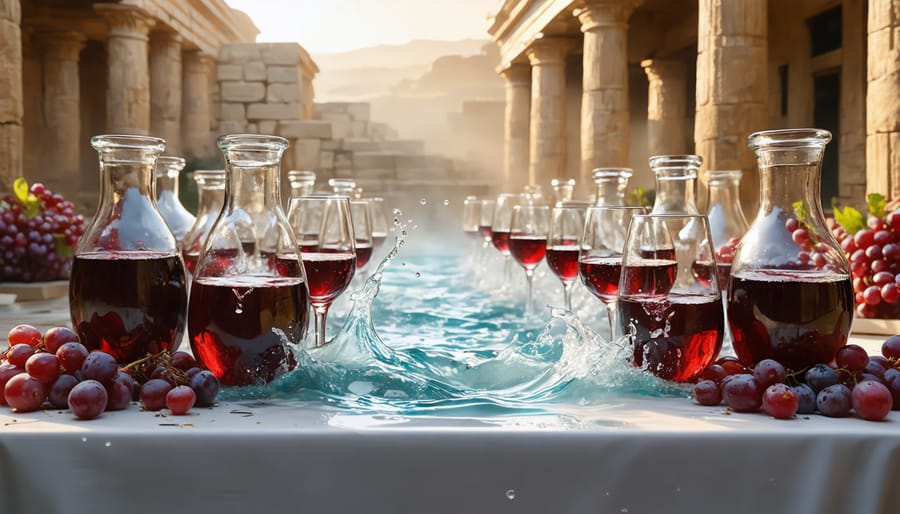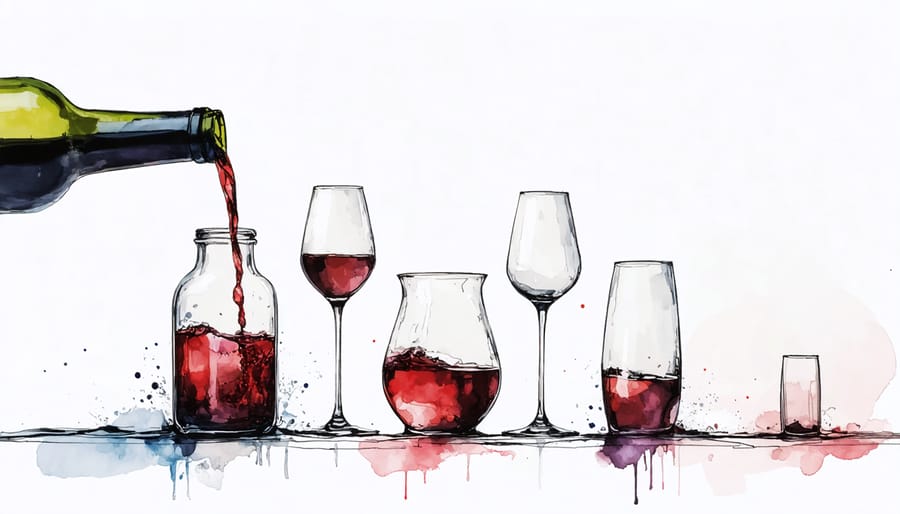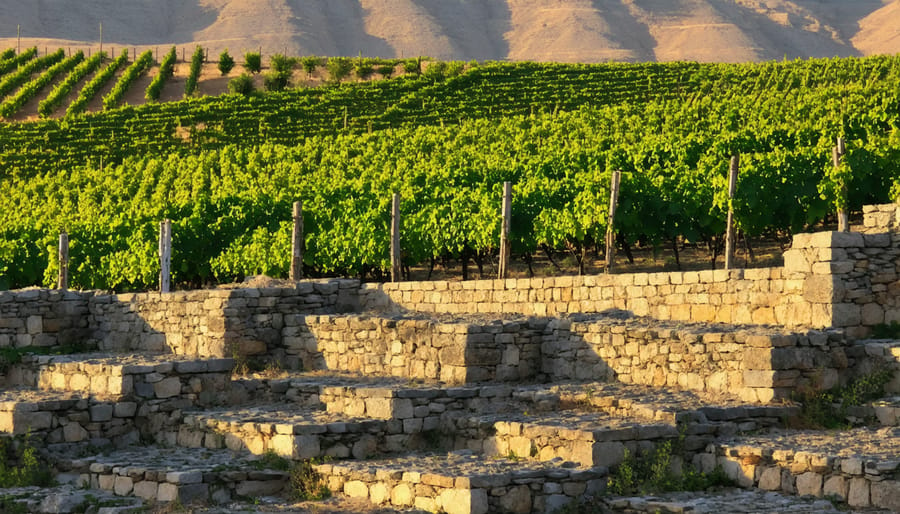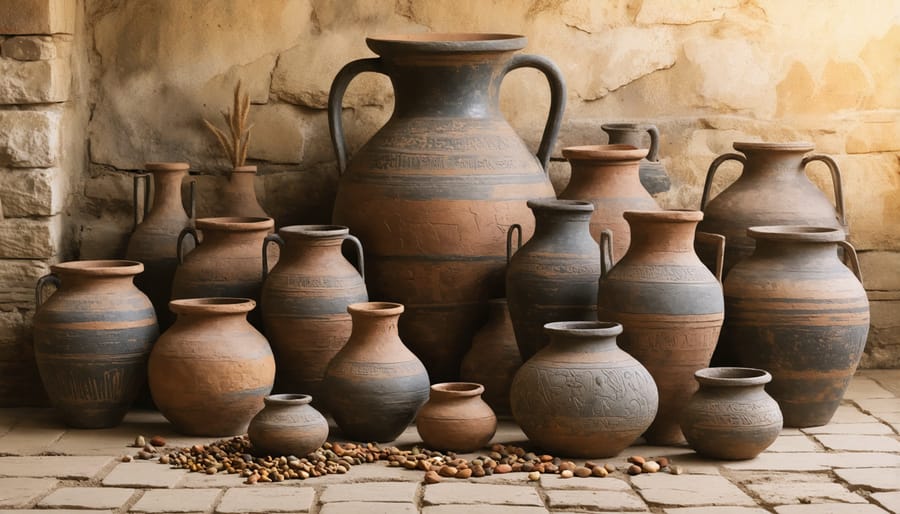
From ancient wedding feasts to modern communion services, wine weaves a rich tapestry through biblical narratives, carrying profound significance that resonates even in today’s world. This beverage appears in over 200 biblical references, serving not just as a celebratory drink, but as a powerful symbol of divine blessing, transformation, and spiritual truth. Jesus’s first miracle at Cana – turning water into wine – marked the beginning of His public ministry, while the Last Supper elevated wine to a sacred symbol of His blood, forever transforming its religious significance. Whether you’re a history enthusiast, a spiritual seeker, or simply curious about wine’s cultural impact, understanding its biblical role offers fascinating insights into both ancient traditions and modern faith practices. Join us as we explore how this humble fruit of the vine became one of the most meaningful symbols in religious history, bridging earthly celebration with divine significance in ways that continue to influence our celebrations and ceremonies today.
The First Miracle: Wine’s Divine Connection
Water to Wine: A Symbol of Transformation
The transformation of water into wine at the wedding in Cana stands as one of Jesus’s most memorable miracles, and it’s more than just a fascinating story – it’s a powerful symbol of divine transformation in our lives. When the wine ran out at the celebration, Jesus didn’t just solve a practical problem; He demonstrated how ordinary elements of life can become extraordinary through divine intervention.
Think of it like this: just as water – something basic and essential – was transformed into wine – something celebratory and precious – our lives too can be transformed through faith. This miracle wasn’t just about creating more beverages for the party; it represented the way Jesus can take the mundane aspects of our lives and infuse them with deeper meaning and purpose.
What’s particularly touching about this miracle is that Jesus chose a wedding celebration for this first public demonstration of His power. It reminds us that spiritual transformation often happens in the midst of community, during times of joy and celebration. The best wine was saved for last, showing us that God’s timing and plans often exceed our expectations in the most beautiful ways.

Celebration and Community
In biblical times, wine played a central role in bringing people together, much like how we gather today for special occasions with our favorite beverages. Throughout the Old and New Testaments, we see countless examples of wine being shared at weddings, festivals, and community celebrations. The Wedding at Cana, where Jesus performed his first miracle by turning water into wine, beautifully illustrates how wine was viewed as an essential element of joyful gatherings.
The Passover celebration, still observed today, traditionally includes four cups of wine, each carrying deep symbolic meaning and fostering a sense of unity among participants. These shared moments weren’t just about the wine itself, but about the connections formed when people came together to celebrate life’s meaningful moments.
During harvest festivals, communities would gather to celebrate God’s provision, sharing wine as a symbol of abundance and gratitude. These celebrations strengthened social bonds and created lasting memories, much like our modern dinner parties and holiday gatherings. The practice of breaking bread and sharing wine became a powerful symbol of hospitality, fellowship, and community building in biblical culture.
Wine as a Symbol of Blessing and Abundance
The Promised Land’s Flowing Wine
When we think of a promised land flowing with milk and honey, it’s fascinating to note that wine was equally celebrated as a symbol of abundance and divine blessing. Throughout biblical texts, the description of the promised land often includes vivid imagery of flourishing vineyards and abundant wine production – a true testament to prosperity and God’s favor.
I’m always moved by passages that describe the Israelites discovering clusters of grapes so large they needed to be carried on poles between two men! These weren’t just ordinary vineyards; they represented God’s fulfilled promises and the richness of the land He had chosen for His people.
The promised land’s wine production wasn’t just about quantity – it spoke of quality and celebration too. Picture settling into a new home where your wine cellar is always full, your vines are always bearing fruit, and there’s always a reason to gather with loved ones to share in this abundance. This beautiful imagery resonates even today, as we gather around our own tables to share wine and create memories with friends and family.
In many ways, these biblical descriptions of wine abundance continue to inspire our modern appreciation for wine as a symbol of life’s sweetness and divine provision.
Sacred Celebrations and Rituals
Wine holds a cherished place in both Jewish and Christian celebrations, weaving together centuries of sacred wine traditions that continue to enrich our spiritual experiences today. In Jewish culture, wine plays a central role in weekly Shabbat celebrations, where families gather to share blessings over a cup of wine, marking the transition from everyday life to sacred time. During Passover, four cups of wine symbolize God’s four promises of redemption, creating meaningful moments of reflection and gratitude.
In Christian worship, wine takes on profound significance through the sacrament of communion. This ritual, also known as the Eucharist, commemorates Jesus’s last supper, where He shared wine with His disciples, declaring it a symbol of His blood and establishing a new covenant. Whether served from ornate chalices in grand cathedrals or simple cups in intimate gatherings, this practice connects millions of believers to their faith’s deepest meanings.
The beauty of these traditions lies in how they transform an everyday beverage into something extraordinary, creating spaces for community, remembrance, and spiritual connection.
Ancient Winemaking in Biblical Times
From Vineyard to Vessel
Have you ever wondered how wine was made in biblical times? The process wasn’t too different from some traditional winemaking methods still used today. Imagine walking through ancient vineyards where families would gather to harvest grapes during the joyous time of year known as the vintage. Workers would carefully pick the ripe fruit and carry them in baskets to the winepress – usually a rock-carved vat where people would tread the grapes with their bare feet.
The fresh grape juice would flow into lower collection basins, where it began its transformation into wine. Clay jars, similar to modern-day amphoras, stored the precious liquid during fermentation. These vessels were often sealed with olive oil to prevent oxidation, a clever technique that helped preserve the wine’s quality.
What’s fascinating is how this ancient process created a deep sense of community. Entire villages would come together for the harvest and pressing, turning what could have been mundane work into a celebration of God’s provision. This social aspect of winemaking reflects why wine became such a powerful symbol of fellowship in biblical narratives.


Wine Storage and Preservation
In biblical times, storing wine was an art form that required incredible ingenuity. The ancient Israelites developed sophisticated wine storage techniques that still influence modern practices. Clay vessels, known as amphoras, were the most common storage containers, often sealed with olive oil to prevent oxidation. These vessels were typically buried in the cool earth or stored in caves, creating natural temperature-controlled environments perfect for aging wine.
What I find fascinating is how these ancient communities discovered that adding a thin layer of olive oil on top of the wine created an airtight seal – a method that protected the wine from spoilage for months or even years. They would also often line their storage vessels with pitch or resin, which not only helped preserve the wine but also added distinct flavors that became highly sought after.
The importance of proper storage wasn’t just practical – it was spiritual too. Wine needed to be preserved carefully to ensure it remained pure and suitable for both daily consumption and sacred ceremonies. These preservation methods helped maintain wine’s symbolic significance in religious rituals throughout the biblical period.
Biblical Wisdom on Wine
Moderation and Responsibility
While the Bible acknowledges wine as a gift from God, it also consistently emphasizes the importance of moderation and self-control. Think of it as finding that sweet spot between appreciation and excess – something many of us can relate to in our modern lives. The scriptures are filled with wisdom about responsible consumption, warning against the dangers of overindulgence while celebrating wine’s proper place in life’s moments.
I’m always struck by how the Bible balances these perspectives, much like we do today when hosting dinner parties or special celebrations. Proverbs, in particular, offers practical advice about avoiding excess, reminding us that too much wine can cloud judgment and lead to poor decisions. It’s fascinating how these ancient teachings still resonate with our contemporary understanding of responsible drinking.
The key message that echoes through biblical teachings is about finding balance – enjoying wine as a blessing while maintaining clear boundaries. This wisdom encourages us to appreciate wine’s role in celebration and community while being mindful of its effects. It’s about celebrating joyfully while staying true to our values and well-being.
Wine’s Place in Daily Life
In ancient times, wine wasn’t just a special occasion drink – it was woven into the fabric of daily life, much like how we might enjoy our morning coffee today. Families would gather around shared meals where wine was a staple alongside bread, olives, and other Mediterranean staples. The practice of diluting wine with water was common, making it safer to drink than potentially contaminated water sources while also ensuring moderation.
During harvest season, communities would come together to pick grapes and prepare wine, creating beautiful moments of connection and celebration. These gatherings weren’t just about production; they were social events that strengthened community bonds and passed down traditions through generations.
Wine also played a practical role in ancient healthcare, often used as a natural antiseptic and mixed with herbs for medicinal purposes. The preservation of wine made it valuable for trade, and families would store their wine in clay vessels, marking different batches for various uses – from daily table wine to special reserves for celebrations and religious ceremonies.
This integration of wine into daily living helps us understand why it features so prominently in biblical narratives and teachings.
As we reflect on wine’s sacred role throughout biblical history, it’s fascinating to see how these ancient traditions continue to influence our modern appreciation of wine. Today, when we gather with loved ones to share a bottle of wine, we’re participating in a tradition that spans thousands of years – one that celebrates both community and gratitude.
Just as biblical figures understood the importance of moderation and reverence, we too can approach wine with mindfulness and appreciation. Whether it’s raising a glass during special celebrations or enjoying a quiet evening with friends, we’re connecting with a rich heritage that values both the spiritual and social aspects of wine.
This beautiful connection between past and present reminds us that wine isn’t just about the beverage itself – it’s about the moments we create, the relationships we nurture, and the traditions we carry forward. By understanding wine’s biblical significance, we can bring more meaning to our modern celebrations while honoring this time-tested symbol of joy, fellowship, and divine blessing.
Let’s continue to cherish these moments, creating our own meaningful traditions while respecting the wisdom passed down through generations.



